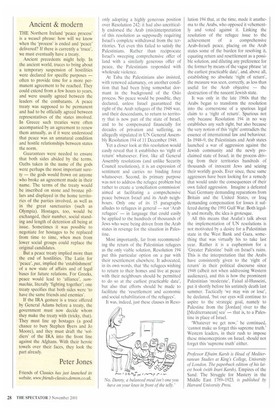DON'T MAKE ISRAEL THE FIRST CASUALTY
Efraim Karsh on the surprising ignorance of
those who blame Jewish intransigence for the attack on the twin towers
FROM the moment the dust settled over the ruins of the World Trade Center, Israel's perceived intransigence over the peace process has been presented as a root cause of the worst ever terrorist atrocity.
Though this analysis is patently false (the Palestinian leadership itself has categorically rejected any such linkage), the Jewish state has come under intense international pressure to fulfil what are generally viewed as its obligations in accordance with UN resolutions. As the Palestinian Authority chairman, Yasser Arafat, stated after his meeting with Prime Minister Blair, We are not asking for the moon, only for the implementation of the relevant UN resolutions.'
This would be a commendable position even ignoring the fact that the Palestinians themselves rejected all these resolutions when they were originally passed. But do the resolutions actually support the envisaged Palestinian solution to the conflict? And have the Palestinians been actively seeking their implementation during their peace negotiations with Israel over the past decade? Any fair-minded observer cannot but answer both questions in the negative.
The foremost document used by the Palestinians to substantiate their call for Israel's complete withdrawal from the West Bank and the Gaza Strip is Security Council Resolution 242 of 22 November 1967 (echoed six years later by Security Council Resolution 338). But this resolution does not demand Israel's complete evacuation of these territories but rather its withdrawal from territories occupied in the recent conflict'. The absence of the definite article 'the' from the text is anything but accidental. Issued a mere six months after Israel's astounding triumph over the concerted panArab attempt to obliterate it, the resolution reflected the keen international awareness of the existential threat posed to the Jewish state by the pre-1967 borders, memorably described by the then Israeli foreign minister, Abba Eban, as 'Auschwitz borders'. Hence there was a general consensus among Security Council members that Israel could not and should not be asked to return to this line, but rather to a somewhat more favourable border that would be negotiated with its Arab neighbours.
Nor does the resolution make any mention of the creation of a Palestinian state. To the contrary, since the Palestinians were widely viewed at the time as refugees rather than a cohesive nation deserving its own state, it was assumed that those terri tories that would be evacuated by Israel would return to their pre-1967 Arab occupiers: Gaza to Egypt, and the West Bank to Jordan. All the resolution had to say about the Palestinians was to affirm the necessity 'for achieving a just settlement of the refugee problem'.
All this is, of course, water under the bridge. Egypt and Jordan have long washed their hands of these territories, and the creation of an independent Palestinian state seems the only realistic option to resolve the Israeli—Palestinian dispute. Yet, as explicitly noted by Resolution 242, the permanent boundaries between Israel and the prospective Palestinian state should not necessarily conform to the pre-I967 line but should rather be mutually agreed as part of a comprehensive settlement that would include 'the termination of all claims or states of belligerency'.
This is precisely what Israel has been trying to achieve since the conclusion of the Oslo Accords in September 1993, especially during Ehud Barak's short-lived government. In line with these accords it has given the Palestinian Authority full control over the Arab population of the West Bank and Gaza, as well as some 40 per cent of the land, as a prelude to the final-status negotiations. Even if Israel were to make no further territorial concessions beyond this, it would still be observing the letter (though perhaps not the spirit) of Resolution 242. But then, during a span of six months, from the Camp David summit of July 2000 to the Taba talks before his crushing defeat in February 2001, Barak crossed every single territorial 'red line' upheld by previous Israeli governments in his frenzied quest for an agreement with the Palestinians. In doing so, he ceded virtually the entire West Bank and Gaza Strip to the nascent Palestinian state, together with some Israeli territory, and made breathtaking concessions over Israel's capital city of Jerusalem.
As such, Barak's government was not
only adopting a highly generous position over Resolution 242: it had also uncritically endorsed the Arab (mis)interpretation of this resolution as supposedly requiring Israel's complete withdrawal from the territories. Yet even this failed to satisfy the Palestinians. Rather than reciprocate Israel's sweeping comprehensive offer of land with a similarly generous offer of peace, the Palestinians responded with wholesale violence.
At Taba the Palestinians also insisted, with renewed adamancy, on another condition that had been lying somewhat dormant in the background of the Oslo process. No peace would be possible, they declared, unless Israel guaranteed the right of the Arab refugees of the 1948 war, and their descendants, to return to territory that is now part of the state of Israel, and to be compensated financially for decades of privation and suffering, as allegedly stipulated in UN General Assembly Resolution 194 of 11 December 1948.
Yet a closer look at this resolution would easily reveal that it establishes no 'right of return' whatsoever, First, like all General Assembly resolutions (and unlike Security Council resolutions), it is an expression of sentiment and carries no binding force whatsoever. Second, its primary purpose was not to address the refugee problem but rather to create a 'conciliation commission' aimed at facilitating a comprehensive peace between Israel and its Arab neighbours. Only one of its 15 paragraphs alludes to refugees in general — not 'Arab refugees' — in language that could easily be applied to the hundreds of thousands of Jews who were being driven from the Arab states in revenge for the situation in Palestine.
Most importantly, far from recommending the return of the Palestinian refugees as the only viable solution, Resolution 194 put this particular option on a par with their resettlement elsewhere. It advocated, in its own words, that 'the refugees wishing to return to their homes and live at peace with their neighbours should be permitted to do so at the earliest practicable date', but also that efforts should be made to facilitate the 'resettlement and economic and social rehabilitation of the refugees'.
It was, indeed, just these clauses in Reso
lution 194 that, at the time, made it anathema to the Arabs, who opposed it vehemently and voted against it. Linking the resolution of the refugee issue to the achievement of a comprehensive Arab–Israeli peace, placing on the Arab states some of the burden for resolving it, equating return and resettlement as a possible solution, and diluting any preference for the former by means of the vague phrase 'at the earliest practicable date', and, above all, establishing no absolute 'right of return', the measure was seen, correctly, as less than useful for the Arab objective — the destruction of the nascent Jewish state.
It was only in the late 1960s that the Arabs began to transform the resolution into the cornerstone of a spurious legal claim to a 'right of return'. Spurious not only because Resolution 194 in no way establishes any such right, but also because the very notion of this 'right' contradicts the essence of international law and behaviour. In 1948-9, the Palestinians and Arab states launched a war of aggression against the Jewish community and the newly proclaimed state of Israel, in the process driving from their territories hundreds of thousands of innocent Jews and seizing their worldly goods. Ever since, these same aggressors have been looking for a remedy that would undo the consequences of their own failed aggression. Imagine a defeated Nazi Germany demanding reparations from Britain and the United States, or Iraq demanding compensation for losses it suffered during the 1991 Gulf War. Both legally and morally, the idea is grotesque.
All this means that Arafat's talk about the implementation of UN resolutions is not motivated by a desire for a Palestinian state in the West Bank and Gaza, something that was virtually his to take last year. Rather it is a euphemism for a 'Greater Palestine' built on Israel's ruins. This is the interpretation that the Arabs have consistently given to the 'right of return' in their political discourse since 1948 (albeit not when addressing Western audiences), and this is how the prominent Palestinian 'moderate', Faisal al-Husseini, put it shortly before his untimely death last summer. Tactically 'we may win or lose', he declared, 'but our eyes will continue to aspire to the strategic goal, namely to Palestine from the [Jordan] river to the [Mediterraneanl sea' — that is, to a Palestine in place of Israel.
'Whatever we get now,' he continued, 'cannot make us forget this supreme truth.' Western leaders, in their rush to impose these misconceptions on Israel, should not forget this 'supreme truth' either.
Professor Efraim Karsh is Head of Mediterranean Studies at King's College, University of London. The paperback edition of his latest book (with Than Karsh ), Empires of the Sand: The Struggle for Mastery in the Middle East 1789-1923, is published by Harvard University Press.



















































































 Previous page
Previous page